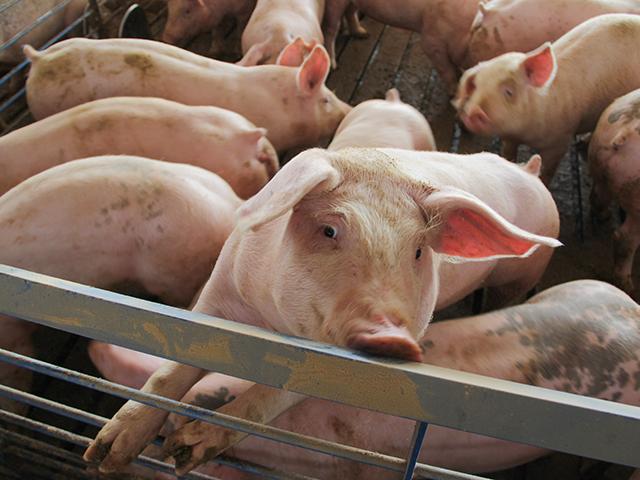Biden Admin Asks SCOTUS to Toss Prop 12
Biden Administration Sides With Ag on SCOTUS Proposition 12 Challenge
LINCOLN, Neb. (DTN) -- The Biden administration asked the Supreme Court to strike down California's attempt to ban the sale of pork from hogs that fail to meet the new production standards is unconstitutional and violates the Commerce Clause.
In a brief filed Monday by the U.S. solicitor general, the Biden administration sided with the American Farm Bureau Federation and National Pork Producers Council in a case against California's Proposition 12. The Supreme Court has scheduled oral arguments for Oct. 11 in the case.
The law requires hog producers across the country to abide by certain regulations to sell pork in California.
In July 2020, the U.S. Court of Appeals for the Ninth Circuit ruled in favor of California's law, stating that although Proposition 12 would have "dramatic upstream effects and require pervasive changes to the pork industry nationwide," the court ruled its own precedent wouldn't allow the ag groups' case to continue.
"The court of appeals went on to say that 'a state law may require out-of-state producers to meet burdensome requirements in order to sell their products in the state without violating the dormant Commerce Clause,'" the Biden administration said in its brief.
"That is true provided that the state's law is directed to, and adequately supported by, a legitimate local interest. Many state laws designed to prevent in-state harms can have extraterritorial effects, even substantial effects, and those effects do not themselves render the laws unconstitutional."
The administration said California, however, has "regulated out-of-state activity in service of an interest that is not a legitimate basis for regulation under our federal system of sovereign states."
P[L1] D[0x0] M[300x250] OOP[F] ADUNIT[] T[]
One animal-rights group, Animal Wellness Action and the Center for a Humane Economy, said in a press statement Monday night the Biden administration was "pandering" to agriculture groups.
"It is shocking that the Biden administration is attacking the rights of states to enact anti-cruelty and food-safety laws," the group's president Wayne Pacelle said in a statement.
"Especially in the absence of even a single federal farm animal protection statute and a general federal dereliction of duty when it comes to safeguarding animals reared for food. Millions of people every year are sickened by a range of bacteria and viruses that flow from factory farms. The state's interest in protecting the interests of Californians could not be more apparent."
The ag groups petitioned the Supreme Court in September 2021. The ag groups had asked the Ninth Circuit for an injunction to stop the law from taking effect.
Voters in the state passed Proposition 12 in 2018 with nearly 63% of voters supporting it. The law forbids the sale of whole pork meat in California from hogs born of sows not housed in conformity with the law. Proposition 12 forbids sows from being confined in such a way that they cannot lie down, stand up, fully extend their limbs, or turn around without touching the sides of their stalls or other animals.
At the end of January, a California court halted the enforcement of Proposition 12, moving back enforcement of the animal-welfare law to six months after rules are finalized.
The California Department of Food and Agriculture is more than two years late in finalizing rules for the law that places animal-welfare restrictions on pork producers who sell products in the state.
The Commerce Clause grants Congress power to regulate trade among states and restricts states from regulating commerce outside their borders, except for matters related to public health and safety.
As of Jan. 1, 2022, Proposition 12 prohibits the sale of pork not produced according to California's production standards. Proposition 12 applies to any uncooked pork sold in the state, regardless of whether it was raised in California.
Back in March 2021, Rabobank said in a report the U.S. pork industry faces a daunting task to comply with Proposition 12 if the legal challenge comes up short.
"With less than 4% of the U.S. sow housing currently able to meet the new standard, Rabobank expects a shortfall in compliant pork to bifurcate the U.S. market, leaving California with a severe pork deficit (and high prices), while generating a surplus in the rest of the U.S. market," the report said.
The NPPC, AFBF and other ag groups have said farmers face a daunting task to continue selling pork to California. Pork producers would need to switch to alternative sow housing systems, requiring billions of dollars in sow-barn conversions or building new barns.
Read more on DTN:
"SCOTUS Oral Arguments Set on Prop 12," https://www.dtnpf.com/…
Todd Neeley can be reached at todd.neeley@dtn.com
Follow him on Twitter @DTNeeley
(c) Copyright 2022 DTN, LLC. All rights reserved.



